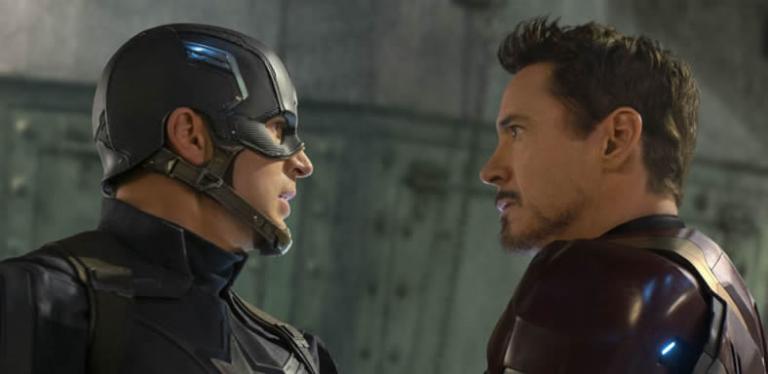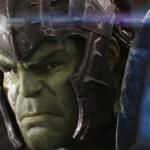
Most testimonies end there, of course—the “happily ever after” version. We don’t hear about the times these newly minted Christians slid back into old destructive patterns or experienced a crisis of faith. We Christians often hide those elements of our own stories. I think that tendency to hide the messy realities of faith can give folks a false impression of what Christianity is. Maybe they assume it’s a miraculous pill that can take all our cares and sinful desires away. Or that it is too good to be true.
But as much as Christians know what a difference faith has meant in their lives—that it is, indeed, truly a miraculous thing—it doesn’t feel so miraculous every day.
Tony’s story is messier than most given Christian testimonies. Because of that, and despite its obvious superheroic flights of fancies, it feels strangely grounded.
In Iron Man 2, Tony’s a mess, throwing a hedonistic birthday party and tossing away his sense of responsibility. In Avengers: Age of Ultron, he’s driven by fear to, with the best of intentions, create a monster. In The Avengers, Captain America (Chris Evans) calls Tony out for his preening selfishness.
“I know guys with none [of your abilities and advantages] that are worth ten of you,” he says. “I’ve seen the footage. The only thing you really fight for is yourself.”
We know that Tony’s better than what Cap says. But we also know that Cap is right, too. Tony may have new purpose now. He acts far more selflessly than he did before. But the old Tony Stark—the Stark we met in that Humvee so many movies ago—is still there, too. His baggage and faults, just like ours, just don’t disappear overnight. Tony’s Arc reactor is no magic wand any more than Christianity is.
It’s the reason why, when it came down to the Captain America/Iron Man showdown we saw in Captain America: Civil War, I found myself—to my own shock—on Team Iron Man.
Civil War takes place in the aftermath of Avengers: Age of Ultron, where the Avengers take down Tony’s sentient-robot abomination (who probably deserves his own blog post). They saved the world again. But not every innocent was alive to celebrate the victory. The victory came at a grave civilian cost.
And so the world’s superheroes are pushed to sign the Sokovia Accords—essentially an agreement that the signees would be put under the authority of the United Nations. If the U.N. gives the Avengers the go-ahead to take on, say, a world-devouring monster, they can assemble. But if the international body says no, the Avengers’ hands are tied.
Steve Rogers, a.k.a. Captain America (who’s had some bad experiences with governmental oversight the last couple of movies) refuses to sign. He won’t turn over his freedom to act to a body of bureaucrats who may have their own competing agendas. “We may not be perfect, but the safest hands are still our own,” he says.
But Tony Stark knows better. He knows his own flaws. He understands his own weaknesses. No matter how good Tony’s intentions may be, he also knows that those intentions can sometimes be undercut by his own very human, very fallible nature.
“We need to be put in check!” Tony says. “And whatever form that takes, I’m game. If we can’t accept limitations, we’re boundary-less. We’re no better than the bad guys.”
Funny: Even though Cap beats Tony in Civil War, the fact that they fought at all—Tony enraged that a brainwashed friend of Cap’s killed his mom and dad decades before—actually proves Tony’s point. Sometimes, we need restraint. We need to check our own selfish desires and passions and submit to something higher than us.
This theme stands at the very core of Christian thought. Why do we need to be saved from our sin? Because we’re incapable of saving ourselves. Our human natures prevent us from doing so. We are fallen and fallible, and sin has worked itself at the very core of our being.
As Christians, we’re told we’re free from our sins, but with that freedom comes with an understanding that we must submit to authority, and we need to obey God’s rules if we want to get a little closer to the people God originally intended us to be.
This isn’t a particularly sexy point of view. To take submission and servanthood seriously doesn’t feel very heroic. But it seems to me as though Tony Stark has come to understand the wisdom of that more than anyone.
Every day I struggle to submit. I’m a pretty headstrong guy. And culturally, we’re encouraged to lead, not follow.
That makes Tony Stark a surprisingly resonant hero for me. Sure, he’s not perfect, but neither am I. Yes, he makes some terrible mistakes. And so do I. But he’s also seen what comes of following your own path. When Tony became Iron Man, he started following a different trail—one not of his own making, but a higher, better one. He chose to serve.
And in my better moments, that’s what I want to do, too.













